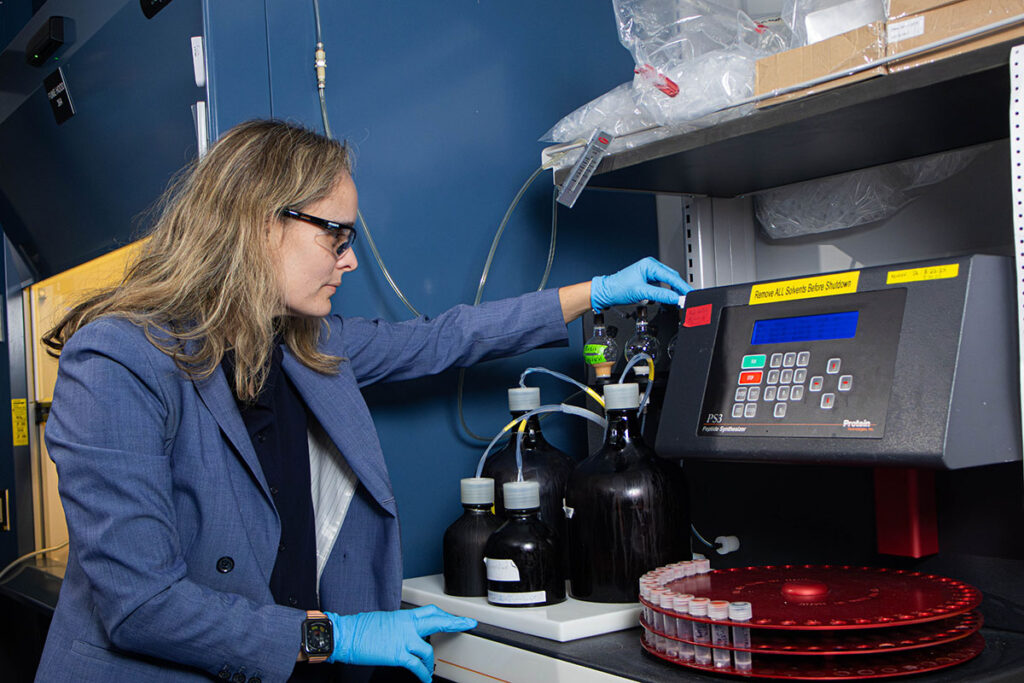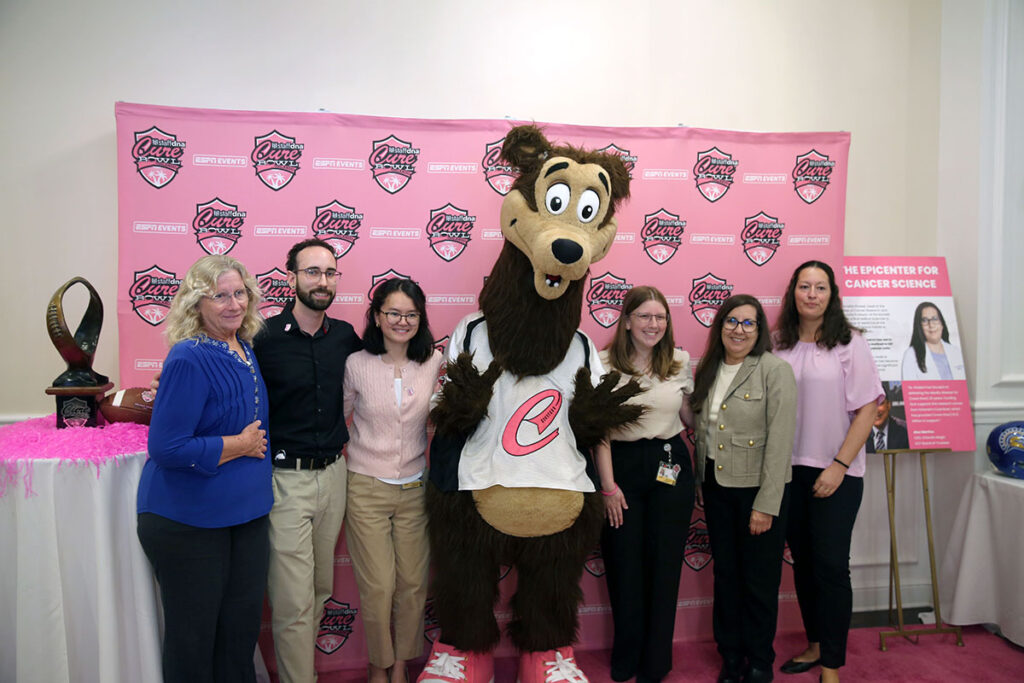A UCF team of researchers is refining their gameplan to tackle cancer.
Dr. Annette Khaled, who leads the College of Medicine’s cancer research division, recently received more than $2 million in grant funding to expand her work with Z-TOP, a peptide she discovered in 2012 that stops the spread of metastatic cancer cells. She is collaborating with UCF College of Engineering and Computer Science colleagues to design a better cellular delivery system for the treatment.

An almost $258,000 grant through the Casey DeSantis Cancer Research Program’s Florida Cancer Innovation Fund will help Khaled’s team further their efforts to stop metastatic breast cancer by disrupting the cellular activities that allow cancer cells to spread. And nearly $1.8 million in funding through the U.S. Department of Defense (DOD), in partnership with the Orlando Veterans Affairs Healthcare System, will allow her to develop the treatment for men with late-stage metastatic prostate cancer.
Dr. Khaled said her research has expanded thanks to the support from the Orlando Sports Foundation, which funds cancer research through sports-related fundraising events. The nonprofit’s flagship event is the StaffDNA Cure Bowl, a unique college football game with the goal of ending cancer.
“When you get funding for a research project, you can only do the work that is described in the specific aims of the project,” she said. “The donations from the Orlando Sports Foundation do not have this limitation. Without their support, I would not have been awarded the DOD grant. Using the donations, I was able to generate the preliminary data that made me competitive for the DOD and the Florida Department of Health (FDOH) grants we received this year.”
Alan Gooch, CEO of the Orlando Sports Foundation and executive director of the StaffDNA Cure Bowl, says he’s grateful to continue partnering with UCF.
“We’re all about bringing teams together,” said Gooch, who played football at UCF and later coached the team for 22 years. “Our relationship with Dr. Khaled is outstanding and we are honored to continue to partner with her and sponsor her research.”
“Cancer is a tough enemy, but we have a great team,” — Dr. Annette Khaled, cancer division lead.
The Science Behind Dr. Khaled’s Work
The two new grants expand Dr. Khaled’s portfolio of research to understand how and why cancer cells spread.
“Cancer treatments are very effective when the cancer is localized, but the problem is that cancer doesn’t stay at one site,” she said. “It spreads to other sites of the body. Usually, the cause of death is not the primary cancer but metastasis. Preventing that can be a cancer cure and that is what we’re looking at here in our lab.”
Dr. Khaled’s latest research focuses on the spread of cell fragments called extracellular vesicles that are shed by cancer cells during the early stages of the disease. These vesicles are resilient to early cancer treatment and can travel through the bloodstream, acting as tumor “seeds” by preparing future sites for metastasis.
The vesicles are mediated by a molecular structure called a chaperonin. Chaperonins help fold proteins that support the body’s normal cell function. But cancer cells hijack the folding process because they need more chaperonins to grow and spread.
Dr. Khaled’s breast cancer research project aims to target chaperonins that help facilitate cancer cells’ growth and stop them without harming normal cells. She hopes to develop a treatment that could regularly deliver her peptide to cancer patients to prevent metastasis. Patients, she said, could receive her treatment while they are receiving chemotherapy and radiation to kill the original tumor.
Her prostate cancer research will confirm the chaperonin as a viable treatment target for prostate cancer and if so optimize the peptide specifically for use in men who have lethal forms of metastatic prostate cancer. Unlike the breast cancer treatment which seeks to prevent metastasis, the prostate cancer research will see if a strengthened variant of the peptide can eliminate cancer that has already spread.

Fielding a Team Against Cancer
In the lab, Dr. Khaled’s peptide has shown success in preventing cancer cells from spreading. The challenge is how to engineer and deliver the treatment. For that, she is collaborating with Dr. Lorraine Leon, associate professor of materials science in UCF’s College of Engineering and Computer Science.
They are working to create a system to deliver the peptide to where the cancer has spread and at the same time protect the peptide from being destroyed in the bloodstream by the body’s immune and digestive systems.
“The College of Engineering and Computer Science is a great collaborator,” Dr. Khaled said. “Normally this peptide is very fragile but we’re working with materials sciences to create a protected peptide and then find a way to get it to the right spot. By having a variety of expertise and interests, we can work together to find new technologies and new ways to combat cancer.”
Dr. Leon specializes in biomaterials and polymer science. Her team studies how to build and program molecules to form assemblies for many purposes, including biomedical transport. She developed a specialized polymer that binds to the peptide, forming a large, water-soluble molecule. This allows it to travel easily through the bloodstream while keeping the peptide intact as it reaches its destination. The system drives the molecules to form self-assembled structures called micelles, which are assemblies of around 100 or so individual molecules, Dr. Leon said.
“In addition, we can tune the shape of these micelles, decorate them with targeting elements, and make mixed versions of them where we incorporate different functionalities,” she said. “Our original designs have had great preliminary results so far. We will continue to optimize the designs moving forward.”
Dr. Leon is excited to team up with Dr. Khaled, and she says she’s looking forward to achieving more breakthroughs together as the projects progress.
“Working with Dr. Khaled has been very fun,” she says. “Our labs really complement each other. This is the beginning of a very long collaboration.”
Dr. Khaled and Dr. Leon are also working with Cancer Specialist and Associate Professor of Medicine Dr. Deborah Altomare and Burnett School of Biomedical Science Biostatistician Xiang Zhu on the prostate cancer research project.
Dr. Khaled says strong research and community collaborations are critical to beating cancer.
“Cancer is a tough enemy,” she said. “But we have a great team.”
These studies are the first phase of preclinical research that may lead to new drugs in the future.
This work was supported by the Office of the Assistant Secretary of Defense for Health Affairs, in the amount of $1,771,271, through the Prostate Cancer Research Program Idea Development Award under Award No. HT9425-25-1-0487. Opinions, interpretations, conclusions, and recommendations are those of the author and are not necessarily endorsed by the U.S. Department of Defense.
Researchers’ Credentials:
Dr. Khaled joined UCF in 2002 after receiving her doctoral degree from the University of Florida and doing post-graduate training at the National Cancer Institute (NCI). A tenured professor, she has been funded by multiple R01 grants from the National Institutes of Health, the Breast Cancer Research Foundation and the FDOH. She has published more than 100 manuscripts and abstracts and presented her research at numerous national and international scientific meetings. She has been recognized with research, leadership and teaching awards, including the NCI CURE Lifetime Achievement Award. In addition to her research responsibilities, she teaches molecular immunology to UCF graduate students and serves as the College of Medicine’s assistant dean for faculty affairs.
Dr. Leon joined UCF in 2017 after postdoctoral appointments at the University of Chicago and Argonne National Laboratory, and she received her doctoral degree from the City University of New York. She is a recently tenured professor in the Department of Materials Science and Engineering, where she also serves as the education director for the U.S. National Science Foundation PREM Center for Quantum Materials Innovation and Education Excellence. She has published more than 20 refereed publications. Other accomplishments include her being named a 2019 Emerging Investigator by the Journal of Materials Chemistry B, receiving an NSF CAREER award in 2021 and a 3M Non-Tenured Faculty award in 2022.